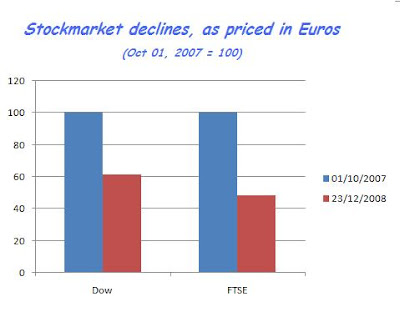Interest on official debt in the USA runs at $430 billion for 2007, and rising steeply, according to the Treasury's own figures (htp
Michael Panzner, quoting Mish's
Global Economic Trend Analysis); total government debt is now c. $9.2 trillion.
It's more serious than that, of course:
James Turk quotes the Comptroller General, David M Walker's estimate that total liabilities, including commitments to future social security benefits, are around $53 trillion. The government's annual revenues are only around 5% of this figure, so the credit card looks like it's pretty much fully-loaded.
However it happens, it seems something must give way under the strain.
Frank Barbera reckons the Dow has plenty further to fall (and possible interim correction or not, he thinks gold looks good).
Prieur du Plessis concurs, quoting Nouriel Roubini's comment that
"... a lousy stock market in 2007 will look good compared to an awful stock market in 2008."Bob Bronson thinks the downturn will be long as well as hard. He in turn quotes the chairman of the National Bureau of Economic Research: this one “could be deeper and longer than the recessions of the past.”Boris Sobolev also looks to gold, but prefers the smaller companies because of all the money that's piled into the majors.In case we in the UK should be tempted by
schadenfreude,
Ashraf Laidi predicts that sterling will accompany the US dollar's fall against other currencies. From what I read in connection with the USA, a weakening currency may provide a temporary boost to exports, but also inflate the cost of imports; so I don't suppose that our following the dollar will do us much long-term good, either.
Of course, it's possible to dismiss all this as group-think wall-of-worry stuff, but maybe that would be double-bluffing ourselves. Sometimes, things are exactly what they seem. Banks have consistently turned a profit for centuries, on the inexorability of debt.
 As concern grows for the future of the dollar, we should reinterpret stock movements to take account of currency exchange fluctuations. The above chart shows the Dow since the start of the year (red line) and adjusted for relative value of the US dollar against the Euro (green line).
As concern grows for the future of the dollar, we should reinterpret stock movements to take account of currency exchange fluctuations. The above chart shows the Dow since the start of the year (red line) and adjusted for relative value of the US dollar against the Euro (green line).




